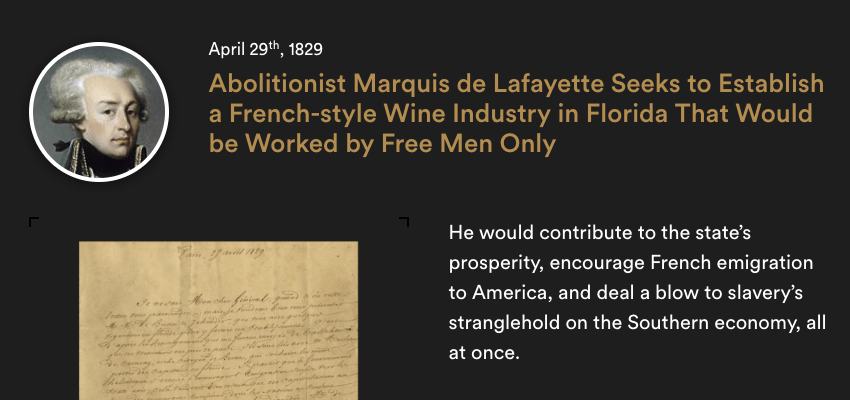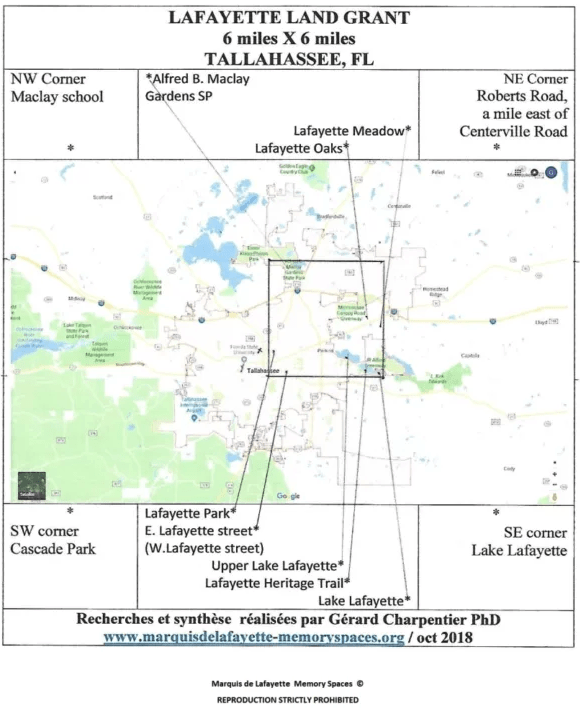
Posted by the Raab Collection
Abolitionist Marquis de Lafayette Seeks to Establish a French-style Wine Industry in Florida That Would be Worked by Free Men Only
He would contribute to the state’s prosperity, encourage French emigration to America, and deal a blow to slavery’s stranglehold on the Southern economy, all at once.
“THE government of Switzerland, whose lack of sufficient land for its burgeoning population resulted in immigration of its youth, promotes the new American republic as a destination rather than the monarchical nations of Europe”
During the Revolution, the Marquis de Lafayette loaned money to the fledgling government of the United States. After the war, to repay the loan, he was given land in Louisiana, and in 1825 was granted additional land in what is now Leon County, Florida, in the Panhandle of the state. Lafayette never visited his land in Florida, but several Frenchmen who knew Lafayette did and bought land in the same area. The hope and plan was to introduce new forms of agriculture into the region.
One of the men interested in Florida was Louis Amede de Buren, whose family had been prominent in Switzerland for generations and whose father had been on the Grand Council of Bern and whose grandfather had been Governor of Lausanne. De Buren was an idealist unhappy with the social system in Europe and interested in emigrating to the new democracy, the United States.
He approached Lafayette with the idea of bringing French grapes to Lafayette’s land in Florida with the goal of establishing a wine industry there. Lafayette liked the idea and wanted it to proceed. At that time, large-scale agricultural work in Florida was performed only by slaves, but Lafayette was an abolitionist, who had once proposed a gradual abolition scheme to his mentor, George Washington. So true to his beliefs, one of the basic tenets of the Lafayette/De Buren enterprise was that no slaves would be purchased or employed in the operation, but free men only. This was a radical position to take, and one that would be unpopular with other planters in the state. However, had free labor succeeded in developing a large wine industry, it might well in time have weakened the hold of slavery on the South.
Simon Bernard was a French general of engineers and aide-de-camp to Napoleon who was banished from France after the Emperor’s fall. He emigrated to the United States and became a brigadier-general of engineers, designing a number of extensive forts for the US Army. His coastal survey became the basis for all American coastal fortifications built before the Civil War. Bernard was well connected in Washington, and indeed throughout the Southern states. A friend of Lafayette, the two carried on a correspondence. So when De Buren was set to leave France for America, Lafayette wrote Bernard describing the proposed concept and requesting that he assist De Buren upon his arrival. The Graham mentioned in the letter was George Graham, who served as Secretary of War in the Madison and Monroe administrations, and was Commissioner of the U.S. Land Office at this time.
Letter signed, Paris, April 29, 1829, to Bernard, with an address panel in Lafayette’s hand that reads “General Bernard, Florida or Washington. By Mm de Buren and Zehender.” The Zehenders had married into the De Buren family, so Albert’s companion was almost certainly a cousin. “I do not know, my dear General, when or where this letter will reach you; but I would like to present to you Messieurs de Buren and Zehender, who are traveling with vignerons [grape cultivators for wine] to Florida to form an establishment there. These gentlemen have undertaken this on information received by me from Tallahassee. They are associated with M. Morlot de Crousaz, a rich citizen of Bern, who wishes to visit the capitals of Florida. It appears that the Helvetic government is encouraging this Swiss immigration to the United States; that is better than capitulation to the service of the European monarchs, who the nations no longer want, and of whom the Suisse themselves are disgusted. M. de Buren was an officer in the Suisse forces in the Netherlands; he is the only one of the two to have come to Paris. This young man is a Republican in the American fashion. He wants to establish in Florida, principally on my land, a property cultivated by free whites. It is a question of introducing into Florida the culture of the vine, of the olive tree, and of silk. If this effort is well received in the country, and if these gentlemen do well, I hope that Florida will see an increase in its agricultural capital and the introduction of good cultivators. You know well how the state of Ohio has profited from emigration. Why would we not give the same to the healthy and fertile areas of Florida? I give to these gentlemen a letter fro my friend Graham. I bid you to give them the help they need.”
This is the only letter of Lafayette we can recall relating to one of his anti-slavery plans, and a search of public sale records going back forty years shows none at all. That he planned to execute it on his own property is all the more extraordinary.
Swiss wariness of European monarchs was soon proven justified when, in 1831, many land owners were forced by the King of Prussia to exchange their feudal rights there for an indemnity. Swiss preference for immigration to the United States soon gathered steam, and after the Civil War a flood of Swiss immigrants made their way to America.
___
https://www.raabcollection.com/american-history-autographs/lafayette-florida
_____
MAP of Land Grant where Marquis de Lafayette would establish an agricultural industry “That Would be Worked by Free Men Only”.

